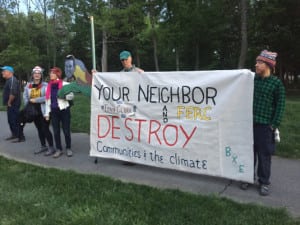FERC Protests Make No Sense
Self-indulgent. Pointless. Arrogant. Undemocratic. Zealotry.
Those are just a few epithets I would direct at the loony leftist “fracktivists” who have targeted the Federal Energy Regulatory Commission for protests over the commission’s exercise of its duties under law with regard to siting natural gas infrastructure.
The whacktivists, who have revived their protests from last fall now that warmer weather has returned, forced FERC to turn its May monthly meeting, usually open to all comers at its D.C. headquarters not far from a newly-resplendent Union Station, into a semi-open meeting. It was streamed over the internet, but FERC restricted access to its main meeting room. The day before the May 19 meeting, the commission issued a statement, saying, “Upon the affirmative vote of Chairman Norman C. Bay and Commissioners Cheryl A. LaFleur, Tony Clark, and Colette D. Honorable, the status of the Commission’s May 19, 2016 public meeting is open to the public via webcast only.”
The protests have been organized by a small group named “Beyond Extreme Energy,” (BXE) whose roots and funding are not transparent. The group appears to have its origins in opposition in Virginia and Maryland to Dominion Resources’ Cove Point LNG export terminal.
Protests against FERC, which the group seems to have discovered in 2014, golly gee whiz, as an agency that approves siting of interstate natural gas pipelines, began that year. Most FERC meetings since have involved individual protestors standing up during FERC monthly open meetings and attempting to vent their objections to the agency. They are then escorted out of the agency. FERC moves on.

This year, the tactics escalated to picketing not only the agency but the homes of the FERC commissioners, leading to arrests. The group calls its action the “Rubber Stamp Rebellion,” claiming FERC is rubber stamping interstate pipelines to move fracked natural gas to international markets. The group is opposed fracking, natural gas, and gas exports. The group also said it would attempt to prevent access to FERC’s May meeting.
Melinda Tuhus, a BXE spokeswoman arrested along with the others in the group for allegedly trespassing, said, “The reason we’re going to the commissioners’ homes is they don’t listen and they need to be held accountable.” The group responded to FERC’s decision to wall off its May meeting with a complaint that FERC “then held their meeting with members of the press and ‘invited guests,’ some of whom were representatives of the fossil fuel industry FERC is supposed to regulate.”
That, of course, is baloney. FERC is a creature of law. It follows a careful administrative path to regulate only a portion of natural gas such as interstate pipelines and LNG import and export terminals. That regulation includes extensive environmental review, driven by many federal laws enacted by Congress, signed by the president, and reviewed and upheld by the U.S. Supreme Court. If the agency were to adopt the path BXE advocates, FERC’s decisions would routinely be overturned by the federal courts. Congress or the White House would likely remove the commissioners, replacing them with others the protestors would also find unacceptable.
As Commissioner Tony Clark said at the May 19 meeting, the proper response of FERC to the protests is to “respond to incivility with civility,” and that he would “encourage those folks who disagree with the law to direct activity to more legal and effective ways,” meaning Congress, which writes the laws.
The protests, particularly targeting the private lives’ of the commissioners, may have cost them support. Miles Keogh, research director at the National Association of Regulatory Utility Commissioners in Washington, tweeted following the picketing of FERC commissioners’ homes that Beyond Extreme Energy “should be ashamed of using intimidation tactics at the homes of public servants. You’ve gotten me off the fence, against you.”